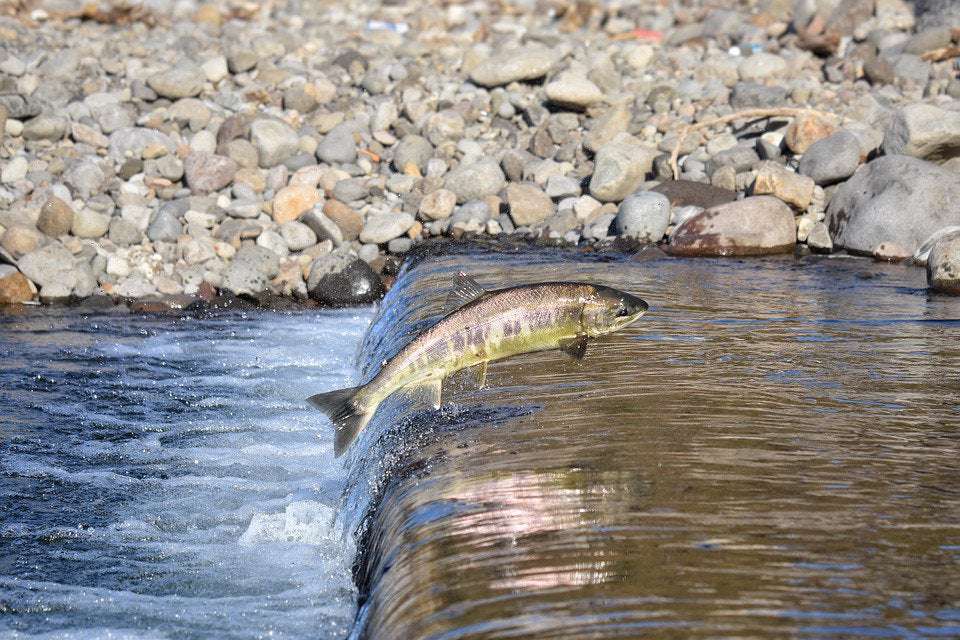There are some restaurants in BC who have decided to take salmon dishes off of their menu over concerns related to declining stocks.
Some of those BC restaurants who have removed the salmon include The Naramata Inn in the Okanagan. Other establishments like PiDGiN in Vancouver’s Gastown and Burdock & Co have decided to stop sourcing local Pacific salmon on their menu. Instead they look for more sustainable aquaculture farm options.
Warming waters that have been linked to climate change, and industrial pollution, as well as agricultural runoff, impact from dams, and issues like overfishing, it has all caused concern for the decrease in salmon populations.
Fisheries and Oceans Canada has decided to shut down most of the BC fisheries to address the problem and try to save wild salmon. Salmon rivers around the Yukon will be closed for commercial fishing this year, at least 60 percent of the fisheries will be forced to close. Recreational fisheries in the Yukon and BC are going to be restricted. It’s expected that a number of fisheries are not going to remain open for commercial harvesting.
For years fish harvesters in the region have been seeing low catches and Pacific salmon especially are in long decline with a variety of reasons attributed to that decrease in salmon population.
Climate Change Mainly To Blame For Decrease in Salmon Population?
So far climate change has been frequently suggested as a culprit that might have contributed greatly to the current problem of the decline in Pacific wild salmon population.
Some in the BC fishing industry have suggested that there is no question as to whether or not climate change might be playing a role in the decline of wild salmon. Those declines have an impact that extends beyond just the restaurant menu at a eatery downtown, it extends to the health of the environment and the health of the economy too.
Other educational programs have been put together that seek to teach communities about sustainable seafood options other than wild salmon. There are restorative species to learn about that provide potential benefits to the environment, can be more cost effective, and taste just as good.
Regenerative aquaculture species and restorative aquaculture is an idea that is being promoted by the World Economic Forum and others around the world today as a potential solution to these problems we see today. There are more sustainable seafood choices that people could be making that they might not know about. These would be seafood items that are harvested in a less damaging way, that are more abundant in the environment, or more resilient to fishing pressures etc.
Examples of sustainable seafood might be items like mussels, oysters, and clams.
Those seafood items like mussels have been referred to as more sustainable options to go with. There are already mussel farming operations that are well aware of this benefit and who are looking to revolutionize the food industry, specifically aquaculture, with their operations.
How can more food be obtained from the oceans in a way that does not deprive future generations of their benefits?
This is the question that scientists have been asking themselves and they have pointed the finger at sustainable seafood options like shellfish, suggesting that today we should be making shellfish a larger portion of our diet.
Mussels, clams, oysters and scallops might not be some of the most popular seafood items to order on the menu and for that it’s assumed that perhaps their potential until now has been largely overlooked. They could provide a sustainable alternative for seafood sourcing today, giving seafood options that are still nutrient dense.
The seafood items like clams, scallops, and mussels can be farmed cheaply and provide an alternative seafood option that has less of an environmental impact than salmon. According to David Willer, a zoologist at the University of Cambridge, the environmental footprint connected with bivalve aquaculture is lower than many arable crops in terms of greenhouse gas emissions, as well as land and freshwater use.
Sustainable seafood has been regarded as the most environmentally efficient source of protein that there is today on the planet. Farmed mussels are among the most sustainable seafood items that you can find today in the market, among other shellfish items like those mentioned above.
In BC salmon are already at risk because of habitat loss, mining, climate change, logging, and the recent heat wave didn’t help matters. The Fraser is known as one of the largest spawning rivers not only in BC but in the world but recently the Interior Fraser coho and Fraser sockeye have been considered threatened.
For those restaurants in BC that did make the move to recently remove salmon dishes from the menu, some have indicated that they are making a political statement with the move, a statement in protest of over-fishing.

jeffcrafff on July 26th, 2021 at 22:58 UTC »
It's gonna be such a trip to tell my children about when we used to eat wild fish for dinner on a regular basis. I wish I appreciated it more as a young'n.
line_4 on July 26th, 2021 at 18:33 UTC »
I'm guessing that the suppliers are also charging premium for wild salmon.
jamalw10 on July 26th, 2021 at 17:32 UTC »